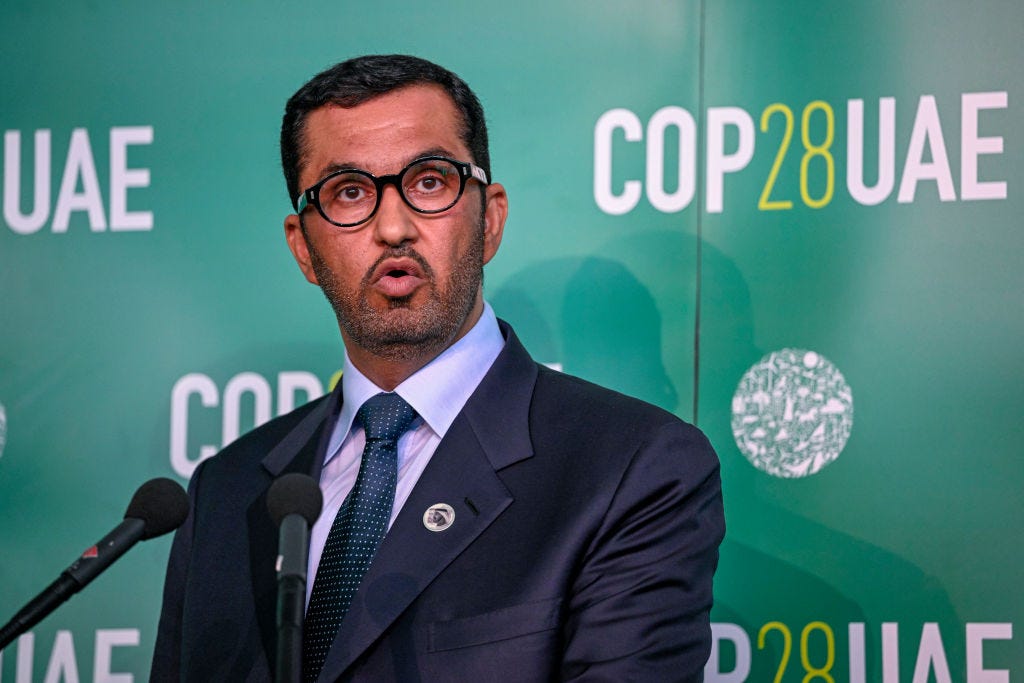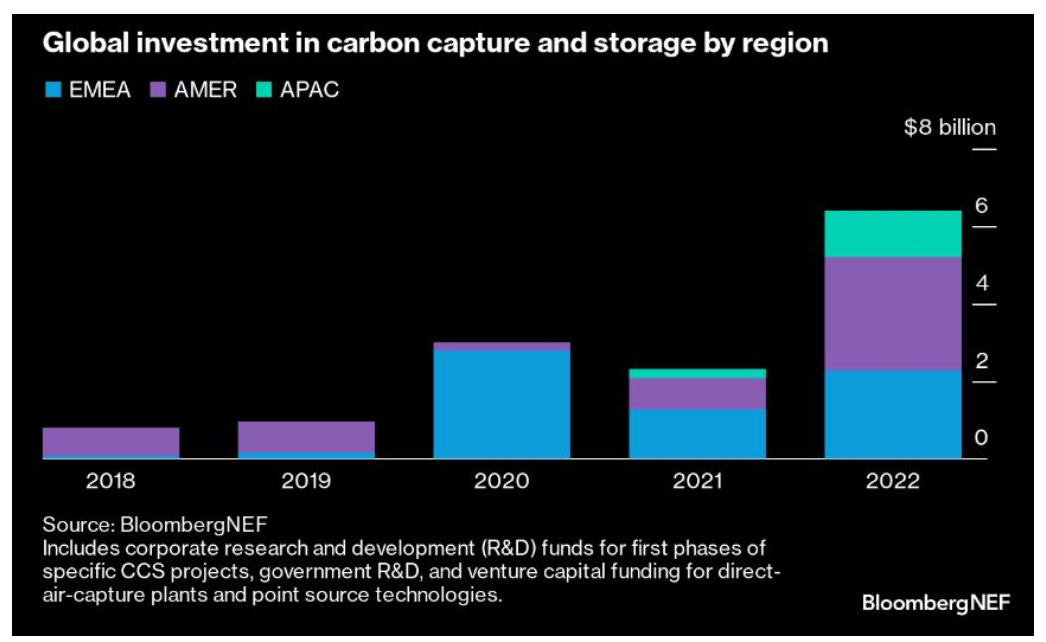Debunking the UAE's B.S.
There is nothing "game-changing" about allowing more oil and gas influence at climate talks.

We’re just two weeks out from COP28, the annual high-stakes U.N. summit where world leaders hash out their plans to stave off global ecological and economic catastrophe from climate change.
This year, the summit will be held in the oil-rich United Arab Emirates and led by UAE oil baron Sultan Al Jaber, who has what he calls a “game-changing plan” to achieve unprecedented progress: Allow oil and gas companies to have more influence over the negotiations.1
If you understand one thing about this plan, let it be this: There is nothing “game-changing” about giving fossil fuel companies more influence at global climate talks. The strategy is merely a repackaging of a decades-long status quo that has resulted in ever-increasing global emissions.
Related reading: How fossil fuel interests choked last year’s climate talks
Since the annual COPs began in the 1990s, polluting interests have been deeply involved in negotiations, sending hundreds of lobbyists each year. At last year’s summit, close to 400 people connected to fossil fuel industries were in attendance—”a grouping that was larger than all but two of the national delegations sent by countries,” according to an Associated Press analysis released this week.2
While it’s difficult to quantify the fossil fuel industry’s influence at these summits because so much of the negotiations happen behind closed doors, two things can be said definitively:
Fossil fuel interests have a consistent, decades-long track record of using their political influence to delay climate action.345
In three decades, the COP talks have yet to produce any agreement to phase out, or even phase down fossil fuels, the leading cause of climate change.
While climate scientists say it’s absolutely necessary to phase down fossil fuels to preserve a livable climate, fossil fuel-producing countries like the UAE argue that such an agreement is not necessary. Instead, the country’s environment minister has said that what’s needed is an agreement to phase down fossil fuel “emissions”—meaning you keep burning fossil fuels, but prevent the emissions from entering the atmosphere with carbon capture technology, while ramping up production of renewable energy. 6
But here’s what’s wrong with that strategy: the world is already doing it, and it’s still far from enough to preserve a safe and stable climate.78
In the last year, global investment in carbon capture has doubled to $6.4 billion, and by 2030, according to the International Energy Agency’s World Energy Outlook, “there are set to be almost 10 times as many electric cars on the road, with renewables nearing half of the global power mix.” And yet even with all that, the IEA adds that if fossil fuel demand keeps apace, global warming would still rise to 2.4°C this century.
This is a level of warming that scientists have categorized as “catastrophic,” leading to “very high-temperature heat waves, crop failure, extreme drought … and in the long term, multi-meter sea level rise.” And it’s far from the 1.5°C goal that the U.N. negotiations are supposed to be attempting to reach.9
The fossil fuel industry’s only answer to this is that they will, essentially, perform a technological miracle. They promise they will improve carbon capture capacity and efficacy so much that we can have our fossil fuels and burn them too.10
But this is a promise that, if broken, will have almost unthinkable, irreparable consequences for the ecosystems we all depend on for survival. And it is a promise being made by actors who have, for decades, continually shown a willingness to put short-term profit over the planet’s long-term condition.
So should we trust it this time, as we head into COP28? U.S. climate envoy John Kerry, while he has “serious questions,” appears to be taking it on good faith. At this year’s summit, he told the Associated Press in an interview, he’ll be pushing for an agreement to phase out “unabated” fossil fuels—a term that refers to not to all fossil fuels, but fossil fuels that don’t have a plan attached for their emissions to be eventually captured. Last month, the European Union also announced that its 27-country bloc will advocate for the phasing out of “unabated” fossil fuels at this year’s COP, instead of just fossil fuels in general. 11 12
There are those who argue that this language is important; that in truth, “unabated” fossil fuels are what the world needs to stave off climate catastrophe. I understand that. And in a technical sense, I agree.13
But I don’t believe the UAE—nor the U.S. or EU, for that matter—is pushing for the “unabated” language because that is what the world “technically” needs. I believe they are pushing for the “unabated” language because it is the only thing that a summit perpetually choked by fossil fuel influence will allow. The word “unabated,” vague and undefined, will provide enough of a window for countries to continue expanding fossil fuel production and increasing their emissions, while claiming to be doing what’s best for the planet. I believe this for no reason other than a decades-long track record of B.S. from these summits, coupled with ever-rising emissions thanks to oil industry lobbyists.
I would love nothing more, however, than to be proven wrong. So I’ll be following along, and I’ll keep you posted. Maybe this time oil companies really will save the world.
Further reading:
An "Unabated" Disaster. Drilled, September 2, 2023.
The UAE holds a major oil and gas conference just ahead of hosting UN climate talks in Dubai. Associated Press, October 2, 2023.
Exclusive: COP28 host UAE to extract nearly 40 billion barrels of oil and gas over 70 years. Energy Monitor, November 13, 2023.
Catch of the Day: Alright everyone, it’s time to cool off with Cooper, a beautiful Bluetick Coonhound who was rescued by dear reader Matt.
Cooper is very lazy, and likes to sleep most of the day, but wakes up for two things: food and squirrels. He's terrified of thunderstorms and fireworks.
Want to see your furry (or non-furry!) friend in HEATED? It might take a little while, but we WILL get to yours eventually! Just send a picture and some words to catchoftheday@heated.world.
Battle Lines Harden Over Big Oil’s Role at Climate Talks in Dubai.
”The executive, Sultan al-Jaber, and other representatives of the Emirates have argued that they have a “game changing” plan to fight climate change by welcoming oil and gas companies from around the world to participate more fully in the talks.”
New York Times, June 13, 2023.
Fossil fuel interests have large, yet often murky, presence at climate talks, AP analysis finds.
”Close to 400 people connected in some way or another to fossil fuel industries attended last year’s United Nations climate talks in Egypt, a grouping that was larger than all but two of the national delegations sent by countries, according to a data analysis of the more than 24,000 participants by The Associated Press.”
Associated Press, November 8, 2023.
The climate responsibilities of industrial carbon producers.
“Fossil fuel producers, particularly in the United States but also in Australia, Canada, and the United Kingdom, have sought to discredit and disparage the scientific evidence, and to deny, diminish, or discount the reality and significance of climate change as a problem. (Gelbspan 2005; Ward 2006; Oreskes and Conway 2010).”
Climatic Change, 2015.
Exxon Lobbyist Caught On Video Talking About Undermining Biden's Climate Push.
”A senior ExxonMobil lobbyist has been captured on camera revealing how the oil giant is using its power and influence to water down US climate legislation.”
Channel 4, June 2021
Documents Show How Polluting Industries Mobilized to Block Climate Action.
”Many scholars have noted the influential role the GCC played in obstructing climate policy in the 1990s, but the first peer-reviewed paper on the group, published this week, reveals that the original and lasting intention of the GCC was to push for voluntary efforts only and torpedo international momentum toward setting mandatory limits on greenhouse gas emissions.”
The Intercept, April 2022.
World not ready yet to 'switch off' fossil fuels, COP28 host UAE says.
”UAE Minister of Climate Change and Environment Mariam Almheiri told Reuters in an interview that phasing out fossil fuels would hurt countries that depend on them for revenue or can not easily replace them with renewable sources. She favored phasing out fossil fuel emissions using capture and storage technologies while ramping up renewable energy, saying this strategy lets countries fight warming while continuing to produce oil, gas, and coal.”
Reuters, May 2023.
The energy world is set to change significantly by 2030, based on today’s policy settings alone.
”World Energy Outlook shows there are set to be almost 10 times as many electric cars on the road, with renewables nearing half of the global power mix, but much stronger policies needed for 1.5 °C”
IEA, October 2023.
Carbon Capture Investment Hits Record High of $6.4 Billion. BNEF, February 2023.
World on track for 2.4C warming despite 2030 pledges: Analysis
”Hare said that estimate would be “really catastrophic” and would lead to “very high-temperature heat waves, crop failure, extreme drought … and in the long term, multi-metre sea level rise”.”
Al Jazeera, November 2021.
Kerry challenges oil industry to prove its promised tech rescue for climate-wrecking emissions
“Oil and gas producers talk up technological breakthroughs they say will soon allow the world to drill and burn fossil fuels without worsening global warming.”
Associated Press, May 2023.
How ‘unabated’ snuck into climate negotiations.
”One word could set global climate negotiations on a trajectory to phase out fossil fuels or allow them to continue powering factories, cars and homes. The word is “unabated.” It refers to fossil fuels whose planet-warming emissions are allowed to enter the atmosphere, rather than being caught through technologies such as carbon capture systems. And its presence in international negotiations is driving a wedge between countries that view abatement as a free pass for oil, coal and natural gas to keep flowing and those who say that allowing fossil fuels, in conjunction with carbon capture technologies, offers an orderly way to address climate change.”
October 18, 2023. E&E News
EU to push for deal on phasing out “unabated” fossil fuels at U.N. climate conference.
”A statement released after a meeting of EU environment ministers on Monday stressed that "the transition to a climate-neutral economy will require a global phase-out of unabated fossil fuels and a peak in their consumption in this decade."“
Euro News, October 16, 2023.
Kerry: U.S. backs proposed fossil fuel drawdown The Hill, November 2022.





Back in the 1930's, when Chicago was trying to rid itself of the influence of wealthy criminals, they didn't call on Al Capone to lead the conference, and they didn't invite Bugsy Siegel, John Dillinger, or Vito Genovese to get their input on the matter - even though these were the biggest and richest players. You don't invite arsonists to a conference on fire safety, or the KKK to a symposium on racism.
This is nothing but a PR stunt by the lead criminals, that's all. Climate talks? What a crock! These aren't climate talks, they're business conferences to find ways to increase profits for the fossils, that's all. There is no shade of lipstick that's going to make this pig presentable at the opera.
Emily,
I too have little or no confidence that the oil and gas industry is prepared to make the necessary changes to become a partner in meeting the warming targets.
But the conundrum, imo, is that we can’t meet those targets without them-the thought of which makes me feel a bit ‘slimy.’
Let’s hope this COP leaves the door ajar.
Thank you for your journalism!
Joe